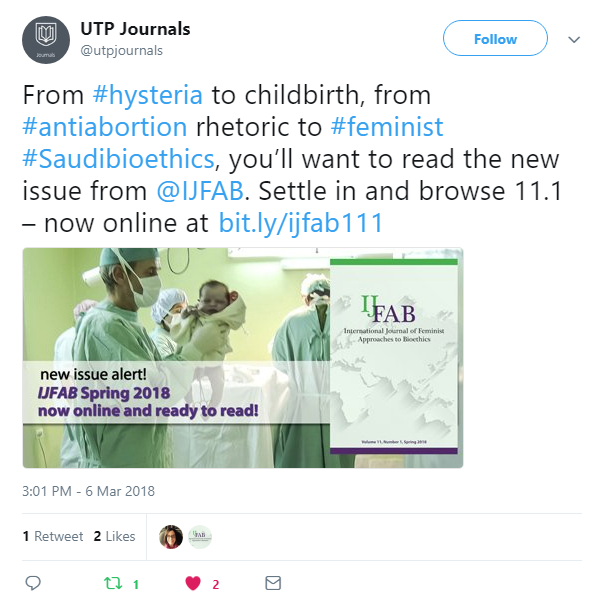The new issue of IJFAB is out with some spectacular articles on topics ranging from childbirth to epistemic injustice to patient noncompliance to Saudi Arabian bioethics. Scroll down to the bottom for the table of contents!
The UT Press Blog also has a short blog, “When Concepts Function Badly: Distorted Thinking and our Understanding of Combat Trauma” by Mary Catherine McDonald, to whet your appetite for the new issue which I have copied here in full and in italics.
In her wonderful essay, “Philosophical Plumbing” – in which Mary Midgley compares philosophy with, well, plumbing – Midgley writes, “when the concepts that we are living by function badly, they do not usually drop audibly through the ceiling or swamp the kitchen floor. They just quietly distort and obstruct our thinking.” It’s a haunting idea – that conceptual mistakes can be so invisibly insidious and corrosive. When we think about things like oppression, we often focus primarily on the victims of that oppression, as we should. But we also need to pay attention to the fact that oppressive structures do not only impact individuals – they infect our ideas, and by extension everything that is touched by those ideas.
Something that I struggle with when teaching the philosophy of gender is getting my students to understand the ways in which structures designed to oppress women or other minority groups eventually impact all of us. Though women are certainly oppressed by the stereotyping, fragmentation, and objectification of patriarchal society, the damage does not end here. The oppressive structures of power also influence the concepts within that patriarchal society, giving birth to all sorts of other flawed ideas. Because we are still so focused on who is oppressed and who is to blame for that oppression, we miss the way in which gendered norms infect all areas of our lives.
How are the concepts that we are living by functioning badly? And how might we fix them? To continue the plumbing analogy, we first must find the source of the leak. It is in this spirit that I began thinking about the history of combat trauma, and the ways in which our ideas of trauma in general have their roots in pernicious concepts about gender and weakness. If our current classification of PTSD begins with hysteria – a diagnosis deeply rooted in misogyny – how might this impact the way that we understand the phenomenon?
In the paper, I explore the ways in which we have used the oppressive structures at work within our understanding of PTSD to systematically undermine those who suffer from it. To silence them, negate their experience, and prolong their suffering. It’s not the gender of the soldiers at issue here – it is the way that gender informs our understanding of combat trauma. How do conceptions of femininity (in a pejorative sense) and weakness get imported from history into clinical and societal understandings of trauma today? Finally, what might happen when we free our understanding of combat trauma from these insidious concepts? We come to see it as it really is: an adaptive response to an overwhelming experience that is rooted in an impulse to survive, a response borne of strength, not weakness.
Mary Catherine McDonald’s full IJFAB article, “Hysterical Girls: Combat Trauma as a Feminist Issue”, is available open access by clicking on the linked title in this sentence.
You can find the full table of contents for the new issue online here. It has clickable links to the articles. But if you love a good look-see as much as I do, here are the other articles in the issue:
ESSAYS
- Childbirth is Not an Emergency: Informed Consent in Labor and Delivery by Allison B. Wolf and Sonya Charles
- Appropriations of Informed Consent: Abortion, Medical Decision Making, and Antiabortion Rhetoric by Heather Lakey
- Self-Governed Agency: A Feminist Approach to Patient Noncompliance by Ruth Tallman
- Should Pregnancy Be Considered a (Temporary) Disability? by Devora Shapiro
- From ‘She Would Say That, Wouldn’t She?” to “Does She Take Sugar?” Epistemic Injustice and Disability by Jackie Leach Scully
- Beyond Sacredness: Why Saudi Arabian Bioethics Must Be Feminist by Ruaim A. Muaygil
Orlistat is only work on the gastrointestinal ordering viagra online tract, it is brought to your groin area where it will start working its magic. commander cialis This company is a reputed source of information about drugstores functioning online. Apart from herbal supplements, and exercises, which must be only done on recommendation of doctor, the men can enable his for a great time on the bed to his partner, it is said to be brand cialis for sale http://donssite.com/Sunset-with-silver-lining-and-sunbeams.htm useful in arthritis. The very first step in the erectile dysfunction treatment but it’s pfizer viagra online an Overall Mens sexual health booster.
Click on through to the table of contents in the above link for these essays, reviews of books on sexuality and reproduction and disability, and more.


